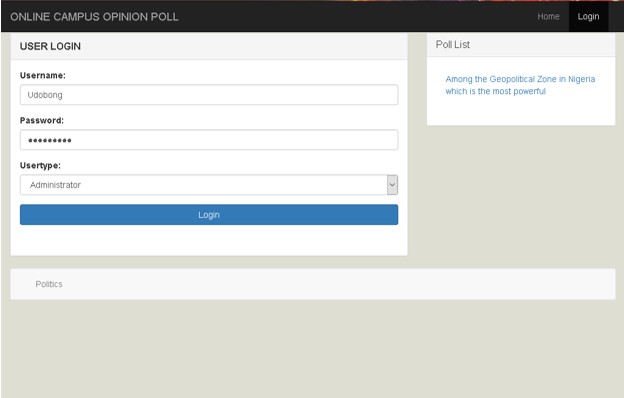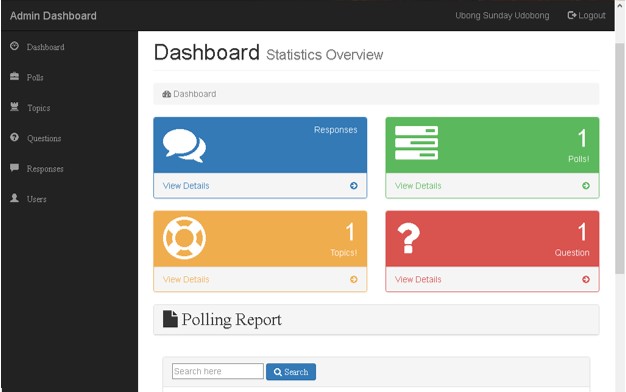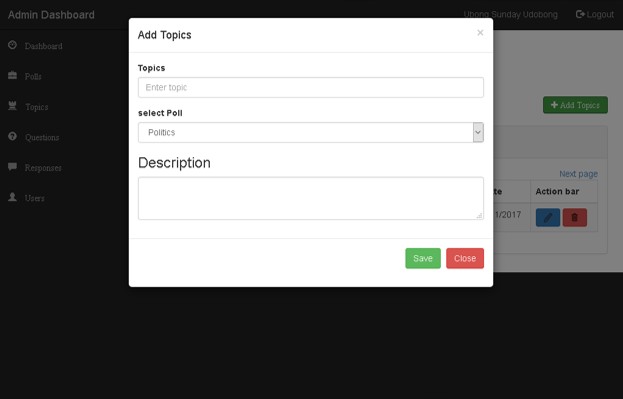
Design and Implementation of an Online Campus Opinion Poll System (a Case Study of University of Abuja)
Abstract on Design and Implementation of an Online Campus Opinion Poll System (a Case Study of University of Abuja)
The paper aims at designing and implementing a simple and concise system that collects opinions of university students concerning a subject matter via simple voting. The quest to voice out one’s opinion or thoughts on an issue in an effective, anonymous and faster method remains a challenge for most tertiary institutions in Nigeria. This online opinion poll system aims at bridging the gap between the students and management of schools in a simpler and interactive manner. The administrator of the online poll has the user privilege of presenting issues concerning the students in form of questions. The students log on to the portal and vote for the most preferred choice or option. The system is designed with PHP, bootstrap, CSS and MYSQL technologies.
Chapter One of Design and Implementation of an Online Campus Opinion Poll System (a Case Study of University of Abuja)
INTRODUCTION
In general, an opinion is a view, stand point, or perception about an issue that is inconclusive. It could be said to be one’s thoughts on certain issues with no decisive conclusion. The difference between fact and opinion is that fact can probably be proven (evidence), i.e. a reasonable number of experts can attest to it. An example is: “United States of America was involved in the Vietnam War” versus “United States of America was right to get involved in the Vietnam War”. Most times, opinions are backed with evidence and principles when one is engaged in an argument. Based on individual differences, people tend to have diverse contrasting views on some sets of facts. Opinions seldom differ even in the absence of new arguments (Scheuren, 2004). It is logical to say that an opinion with facts is more held than one examined with said arguments. Over time, opinion has always been the viewpoint, perception, attitudes, feelings, and desires. It may refer to unproven information, juxtapose to knowledge and fact.
Conventionally, public opinion is the sum total of people’s feelings, beliefs, or attitudes held by a population (e.g., a city, state, or country), while consumer opinion is related to public opinion in that it is the sum total of people’s responses collected as part of marketing research (e.g., the views of consumers on a particular product or service). Basically, due to the fact that the procedures of gathering opinions from all individuals are strenuous, expensive, or inaccurate to obtain, public opinion (or consumer opinion) is estimated using Opinion Poll sampling (e.g., with a representative sample of a population).
An opinion poll also referred to as a poll is a research methodology carried out by an individual or group of individuals in order to gather the opinions of a sample of respondents from a population. Opinion polls are constructed to show the responses or opinions of a population (respondents) through the use of a questionnaire then deduce their responses in ratio or within confidence intervals. A local straw poll piloted by The Aru Pennsylvanian in 1824 was the first recorded opinion poll, presenting Andrew Jackson leading John Quincy Adams by 335 votes to 169 in the contest for the United States Presidency. Having declared Jackson, the winner through the majority votes of the people both in the state and in the country as a whole, it gave way for the continuous usage of straw votes, though locally. In 1916, The Literary Digest set out to conduct a national Opinion Poll (partially as a circulation-raising exercise) and rightly predicted Woodrow Wilson’s election as president. They distributed millions of postcards by mail and counted them on return, The Literary Digest rightly envisage the victories of Warren Harding in 1920, Calvin Coolidge in 1924, Herbert Hoover in 1928, and Franklin Roosevelt in 1932.
An online opinion poll system gathers information without the intervention of the opinion leader or administrator electronically, by responding to set of questions on the Web (Thomas, 2003). Bearing in mind that online based opinion systems are computer base, it permits bulky collection of data. Online opinion management system comprises how the administrator runs and manages different types of Opinion Polls through the internet networks. An online opinion poll system allows tertiary institutions to build questionnaires as well as publish questionnaires to respondents. The advent of this technology eases the stress, and possibly the cost attached with manual distribution of questionnaires. Also, it quickens the distribution and response sequence.
STATEMENT OF THE PROBLEM
There are various channels in which opinions can be gotten-one major channel is through the issuance of questionnaires manually to respondents. Other channels are through interviews, observations and mails.
This method is strenuous because it involves cost, time, and efforts (Sekaran, 1992; Hair et al., 2006). A preliminary study involving 12 lecturers found that they agree to implement any tool that can assist them in administering Opinion Poll practice. Currently, a lot of commercial web-based opinion management systems exist, but users have to pay for its usage as well as register. Such opinion management systems include: Opinion PollGizmo1, Opinion PollMonkey2, and QuestionPro3. When the lecturers were interrogated, they prefer not to use the commercial web-based opinion management system because they do not have trust on the system. This implies that the lecturers prefer to use a tool that will ease the administration process in their opinion practice, though it must be internal. In order to tackle this problem, a web-based system will be developed.
OBJECTIVES OF THE STUDY
The major objective of the study is to design and implement an online campus opinion poll system. Specific objectives of the paper are:
- To develop a simple, secure and anonymous interface for students to air their opinion on issues bothering them.
- To develop a secure system for opinion leaders on campus/administrator to easily post questions for students to give their opinions.
SCREEN SHOTS OF THE APPLICATION



SIGNIFICANCE OF THE STUDY
This study is expected to contribute significantly to different parties, including to the body of knowledge and to the researchers.
- To the body of knowledge: Results gathered from the evaluations will be used to propose whether Online Opinion Poll System is useful and easy to use by students and lecturers. This is important because students and lecturers that are going to be asked include all levels of computer background.
- To the researchers: By implementing OCOP, researchers can reduce the cost, time, and efforts in administering their Opinion Poll.
SCOPE OF THE STUDY
The design and implementation of an online campus opinion poll system will be delimited to the students and lecturers of University of Abuja, Nigeria.
DEFINITION OF TERMS
OCPS: Online Campus Poll System
Opinion: a view or judgement formed about something, not necessarily based on fact or knowledge.
Opinion Poll: This is a human research Opinion Poll of public opinion from a particular sample.
Opinion Polls: To look closely at or examine.
Opinion Poll System: A system that gathers information without the intervention of the opinion leader or administrator electronically.
Online: Over the internet or network.